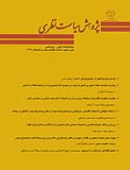ایدهای غیر توتالیتر از «جمعیبودگی» انسان
محورهای موضوعی : Research in Theoritical Politics
1 -
کلید واژه: هایدگر دازاین دیگری جمعیبودگی سوبژکتیویسم,
چکیده مقاله :
در جهان فردانگارانۀ امروز، آنچه از همه بیشتر مورد غفلت واقع شده، «جمعیبودگی» انسان است. این مقاله قصد دارد با تفسیر برخی از مفاهیم اندیشۀ هایدگر مثل «با هم بودن»، «جماعت» و «برون خویشی»، این نکته را نشان دهد که «جمعی بودگی» یکی از ساختارهای اصلی انسان به مثابه دازاین است. در اینجا با اعتراف به اینکه هر یک از ما دارای وجودی تکین و منحصر به فرد هستیم، این نکته را نشان می دهیم که «زبان» مفهومی است که کلیت انسان را تعیین می کند. فرایند سیال عمل «جمعی بودگی»، نام گذاری است. نام نهادن زبان بر چیزها، کنشی است که چیزها را در «جهان» گرد هم می آورد. قرینۀ همین عمل هم در سیاست به مثابۀ «جمعی بودگی» رخ می دهد؛ در سیاست نیز انسان ها در کنار همدیگر قرار می گیرند. اما مفهوم امر سیاسی در غرب، تکینگی ها و دیگری را سرکوب کرده و ساختارهای سوبژکتیویستی را بر انسان تحمیل می کند. بنابراین از اندیشیدن دربارۀ جمعی بودگی ناتوان است.
The concept of "human communality" is the most neglected notion in the contemporary individualistic world. Interpreting some concepts of Heidegger's thought such as 'Being-with', 'community' and 'ekstasis', this essay intends to show that "communality" is one of the main structures of man regarded as Dasein. Although we confess that each of us has a singular and unique existence, this fact cannot be disregarded that "language" determines the totality of mankind. The fluid process of "communality" is "giving something a name". Giving names to the things by language is the action that puts together things in a world. The symmetry of this action also happens in politics as "communality"; in politics, people are located beside each other. But the concept of the political issue in the West suppresses the singularities and others and imposes the subjectivistic structures on western man. Therefore, the occident is unable to think about "communality".


